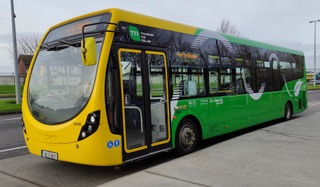Go-Ahead Bus have announced a profit for 2021 of €2.6 million. They operate 200 buses in Ireland and at present employ 620 people, and intend to recruit another 180 as they continue to tender for public transport routes, which will bring them up to a total of 800 workers.
These figures show that they are making €13,000 per bus, or a profit of €4,193 per worker. Coincidentally, Go-Ahead Bus pay their drivers €4,000 per year less than Dublin Bus pay theirs.
These lower wages are the main variable involved when Go-Ahead Bus compete with Dublin Bus and Bus Éireann for public transport contracts. Go-Ahead are akin to an agency for bus drivers, and the bus drivers are akin to a charity for shareholders, as the drivers are paid lower rates of pay in order to create profits and dividends for the shareholders.
Is this the model we want for public transport in Ireland?
When the state opened up the bus market to tenders from other companies it was said that it was to create competition in the market. Competition would imply in most people’s opinion a better service, increased frequency, better-quality buses, and cheaper fares. The reality of the situation is that the buses are owned by the National Transport Authority, the fares go directly to the National Transport Authority, and the routes and schedules are set by the National Transport Authority. The only place there is actual competition is in the price that companies offer to operate the services for. The main method they use for reducing costs is paying their workers lower wages.
Go-Ahead is not there to compete with the state-owned operators: they are there to reduce wages in a race to the bottom in transport workers’ pay.
Lower pay leads to lower standards of living, lower quality of life, poorer diet, mental health problems, higher obesity levels, to name but a few, which in turn adds costs to the state and puts extra strain on an already creaking health service. The lower levels of pay also lead to lower levels of disposable income for workers to spend in the economy.
The ideologically driven politicians who make these decisions should look at the bigger picture. There is a knock-on effect to bring in this so-called “competition” to public transport. The dividends and profits of Go-Ahead go back to their shareholders in Britain.
CIE was set up under the Transport Act (1950). Section 15 (subsection 1) of the act states:
It shall be the general duty of the Board so to exercise its powers under this Act as to provide or secure or promote the provision of an efficient, economical, convenient and properly integrated system of public transport for passengers and merchandise by rail, road and water with due regard to safety of operation, the encouragement of national economic development and *the maintenance of reasonable conditions of employment for its employees* and for that purpose it shall be the duty of the Board to improve in such manner as it considers necessary transport facilities so as to provide for the needs of the public, agriculture, commerce and industry.”
It appears that the ideologues in Leinster House have forgotten the needs of our citizens and ignored the original purpose of the public transport system on their never-ending journey of privatisation and the transfer of public wealth into private hands.
The profits of public transport should not be measured in euros but in the benefits provided to the citizen, to industry, to education and the public well-being by transporting people to their places of work, education or social activity quickly, safely and efficiently in a sustainable fashion.






